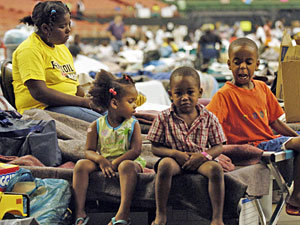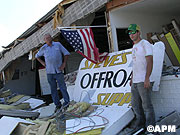Audio
Photos
More from MPR
| |||||||||||||||||||||||||||
 |
| Hurricane Katrina evacuees sit on cots on the floor of the Astrodome in Houston on Tuesday. Many of the evacuees who'll arrive in Minnesota will do so from Texas. (STAN HONDA/AFP/Getty Images ) |
St. Paul, Minn. — The governor's orders provide some assistance for officials who are planning for the Katrina victims' needs both short-term and long-term. The National Guard's Camp Ripley will serve as a place not only for survivors to rest, eat, and obtain medical help short-term, but also as a central place for volunteer organizations to begin helping victims long-term.
Minnesota National Guard Adjutant General Larry Shelito says while the surroundings will be sparse, there will be phone and internet service so survivors can try to reunify with family and friends.
"We have phone companies coming in giving us cellphones with free air-time and phone cards also. So they'll have the ability to start doing their self checks and contacting people and we will also have for them a return phone and address numbers so they can be contacted later," he said.
The latest information from FEMA says the survivors will be arriving from the temporary shelters in Texas. Texas has so far helped house and feed a quarter of a million victims. But how many of them will arrive and when is unknown says Minnesota Commissioner of Public Safety Michael Campion. He says the state won't know anything about the new arrivals until they board the airplane.
"There's a cultural challenge there; there's probably people there who know where Minnesota is and in some sense it's a foreign country, so it may be a challenge a bit for people to say, 'sure, I don't know anything about Minnesota, but I'll get on a plane and go.' So how that process will take place, frankly we're not aware of," Campion said.
The American Red Cross says it has three basic needs: money, blood, and volunteer help at local chapters. St. Paul's Red Cross CEO Dave Therkelsen says the Red Cross has had an outpouring of volunteers who want to help at Camp Ripley or in the disaster zones, but where the organization really needs help, is at its local chapters.
"A whole lot of very experienced disaster relief workers are on assignment, leaving chapters themselves pretty thin for anything that could happen in the local communities. And disasters keep happening -- single-family fires and such -- in spite of the aftermath of Katrina," according to Therkelsen.
Therkelsen says the Red Cross is also trying to help families reconnect by a reunification service on its Web site (redcross.org). He says the Web site received 75,000 inquiries over the Labor Day weekend.
Plans have shifted on several fronts in helping the hurricane victims. Despite St. Paul Mayor Randy Kelly's comments that he and other Minnesota mayors would hold a conference call, that call never happened. His office said mayors are now working with the League of Minnesota Cities on a letter to all mayors about early plans. That call, the office said, could happen late Thursday or Friday.
In addition, even though Kelly said the DNR would be managing donations at the state fairgrounds for transport to Camp Ripley, the DNR says those plans have changed.
Shifting plans and confusion could be commonplace in the next few weeks and even months as officials try to manage the influx of thousands of hurricane victims to Minnesota.
Minneapolis Mayor R.T. Rybak says the public should be cautious in its expectations that locating housing, medical care and schooling for the survivors will be simple both short-term and long-term.
"We shouldn't be sugarcoating this issue," he said. "This is a huge undertaking. These are very large numbers. These are people with great needs. These are people from very different cultures and anybody who says we can snap our finger and get this done easily is not looking at the details."
Rybak says survivors are already showing up in Minnesota on the own. He says people have driven busses down to the disaster areas and Houston and have arrived in Minnesota.




